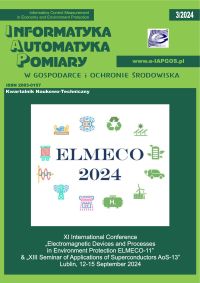KOMPUTEROWE PROGNOZOWANIE TRYBÓW TECHNOLOGICZNYCH SZYBKICH STOŻKOWYCH FILTRÓW ADSORPCYJNYCH Z CHEMICZNĄ REGENERACJĄ JEDNORODNYCH POROWATYCH OBCIĄŻEŃ
Andrii Bomba
National University of Water and Environmental Engineering, Dept. of Applied Mathematics, Rivne, Ukraine (Ukraina)
http://orcid.org/0000-0001-5528-4192
Yurii Klymyuk
klimyuk@ukr.netNational University of Water and Environmental Engineering, Department of Applied Mathematics (Ukraina)
http://orcid.org/0000-0003-3672-8469
Ihor Prysіazhnіuk
Rivne State University of Humanities, Dept. of Hanging Mathematics, Rivne, Ukraine. (Ukraina)
http://orcid.org/0000-0003-4531-1788
Abstrakt
Sformułowano matematyczne modele do prognozowania trybów technologicznych filtracji (oczyszczanie wody z obecnych zanieczyszczeń), płukania wstecznego, regeneracji chemicznej i bezpośredniego przemywania szybkich stożkowych adsorpcyjnych filtrów z uwzględnieniem wpływu temperatury na kinetykę wewnętrznego przenoszenia masy przy zachowaniu stałych prędkości odpowiednich trybów. Opracowano się algorytmy numerycznie asymptotycznych aproksymacji rozwiązań odpowiadających problemów nieliniowych pojedynczo zaburzonych brzegowych dla domeny modelu o kształcie stożka, ograniczonej dwiema powierzchniami ekwipotencjalnymi i powierzchnią przepływu. Proponowane modele w kompleksie pozwalają na prowadzenie eksperymentów komputerowych w celu zbadania zmiany stężeń zanieczyszczeń w strumieniu filtracyjnym i na powierzchni adsorbentu obciążającego, temperatury przepływu filtracji, współczynnika filtracji oraz porowatości czynnej wzdłuż wysokości filtra ze względu na procesy adsorpcji i desorpcji, na ich podstawie przewidzieć bardziej optymalne zastosowania adsorbentów i wydłużenia czasu ochronnego szybkich stożkowych filtrów adsorpcyjnych z chemiczną regeneracją jednorodnych porowatych obciążen.
Słowa kluczowe:
model matematyczny, proces oczyszczania wody, adsorpcja, szybki stożkowy filtr, regeneracja chemiczna, jednorodne porowate obciążenieBibliografia
Bomba A. Ya., Klymiuk Yu. Ye.: Mathematical modeling of spatial singular-perturbed filtration-convection-diffusion processes. TzOV firma "Assol", Rivne 2014.
Google Scholar
Bomba A. Ya., Prysiazhniuk I. M., Prysiazhniuk O. V.: Methods of perturbation theory for predicting heat transfer processes in porous and microporous media. O. Zen, Rivne 2017.
Google Scholar
Bomba A. Ya., Safonyk A. P.: Modeling of nonlinearly perturbed processes of purification of liquids from multicomponent contaminants. NUVHP, Rivne 2017.
Google Scholar
Edzwald J.: Water Quality & Treatment. A Handbook on Drinking Water, McGraw-Hill Professional, 2010.
Google Scholar
Heikkinen M., Poutiainen H., Liukkonen M., Heikkinen T., Hiltunen Y.: Self-organizing maps in the analysis of an industrial wastewater treatment process. Mathematics and Computers in Simulation 82(3), 2011, 450–459.
DOI: https://doi.org/10.1016/j.matcom.2010.10.021
Google Scholar
Hendricks D. W.: Fundamentals of water treatment unit processes: physical, chemical, and biological. CRC Press, Boca Raton 2011.
Google Scholar
Ives K. J.: Deep-bed water filters. New developments. Filtr. and Separ. 6(1), 1969, 42–48.
Google Scholar
Kalteh A. M., Hjorth P., Berndtsson R.: Review of the self-organizing map (SOM) approach in water resources: analysis, modelling and application. Environmental Modelling and Software 23(7), 2008, 835–845.
DOI: https://doi.org/10.1016/j.envsoft.2007.10.001
Google Scholar
Klimjuk Ju. Je.: Construction of filtration fields for rapid filters conical shape with homogeneous porous loads. Proceedings of II International scientific conference “World Science in 2016: Results”. Lulu Press, Morrisville 2017, 95–99.
Google Scholar
Klimjuk Ju. Je.: Prediction of changes in the characteristics of filter materials in rapid cone-shaped waterpurifying filters. Innovative solutions in modern science 8(27), 2018, 72–84.
Google Scholar
Nevzorova A.B.: Fundamentals of automation of water supply and sanitation. UO BelGUT, Gomel 2005.
Google Scholar
Maleki A., Pajootan E., Hayati B.: Ethyl acrylate grafted chitosan for heavy metal removal from wastewater: Equilibrium, kinetic and thermodynamic studies. Journal of the Taiwan Institute of Chemical Engineers 51(0), 2015, 127–134.
DOI: https://doi.org/10.1016/j.jtice.2015.01.004
Google Scholar
Maier H. R., Dandy G. C.: Neural networks for the prediction and forecasting of water resources variables: a review of modelling issues and applications. Environmental Modelling and Software 15(1), 2000, 101–124.
DOI: https://doi.org/10.1016/S1364-8152(99)00007-9
Google Scholar
Makarevich N. A., Bogdanovich N. I.: The theoretical basis of adsorption. SAFU, Arkhangelsk 2015.
Google Scholar
Mincz D. M.: Theoretical foundations of water purification technology. Strojizdat, Moscow 1964.
Google Scholar
Safonyk A. P.: Modelling the filtration processes of liquids from multicomponent contamination in the conditions of authentication of mass transfer coefficient. International Journal of Mathematical Models and Methods in Applied Sciences 9, 2015, 189–192.
Google Scholar
Sakalova H. V., Vasylinych T. M.: Investigation of the efficiency of purification of heavy metal ions from wastewater using natural adsorbents. TOV Tvory, Vinnytsia 2019.
Google Scholar
Vries D., Bertelkamp C., Schoonenberg Kegel F., Hofs B., Dusseldorp J., Bruins J. H., de Vet W., van den Akker B.: Iron and manganese removal: Recent advances in modelling treatment efficiency by rapid sand filtration. Water Research 109, 2017, 35–45.
DOI: https://doi.org/10.1016/j.watres.2016.11.032
Google Scholar
Zevi Y., Dewita S., Aghasa A., Dwinandha D.: Removal of Iron and Manganese from Natural Groundwater by Continuous Reactor Using Activated and Natural Mordenite Mineral Adsorption. International IOP Conf. Ser., Earth Environ. Sci, 111, 2018, 012016, 1–7.
DOI: https://doi.org/10.1088/1755-1315/111/1/012016
Google Scholar
Autorzy
Andrii BombaNational University of Water and Environmental Engineering, Dept. of Applied Mathematics, Rivne, Ukraine Ukraina
http://orcid.org/0000-0001-5528-4192
Autorzy
Yurii Klymyukklimyuk@ukr.net
National University of Water and Environmental Engineering, Department of Applied Mathematics Ukraina
http://orcid.org/0000-0003-3672-8469
Autorzy
Ihor PrysіazhnіukRivne State University of Humanities, Dept. of Hanging Mathematics, Rivne, Ukraine. Ukraina
http://orcid.org/0000-0003-4531-1788
Statystyki
Abstract views: 255PDF downloads: 189
Licencja

Utwór dostępny jest na licencji Creative Commons Uznanie autorstwa – Na tych samych warunkach 4.0 Miedzynarodowe.
Inne teksty tego samego autora
- Andrii Bomba, Andrii Safonyk, Olha Michuta, Mykhailo Boichura, ZASTOSOWANIE METODY QUASIPOTENCJALNEJ DO ROZWIĄZYWANIA ZADANIA IDENTYFIKACJI PARAMETRYCZNEJ OŚRODKÓW ANIZOTROPOWYCH , Informatyka, Automatyka, Pomiary w Gospodarce i Ochronie Środowiska: Tom 9 Nr 1 (2019)








